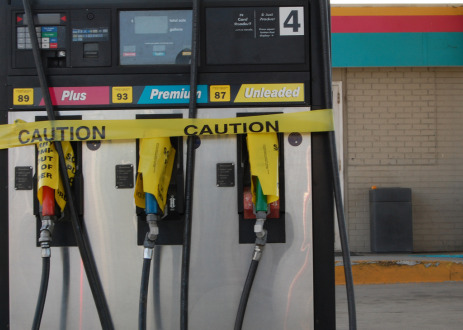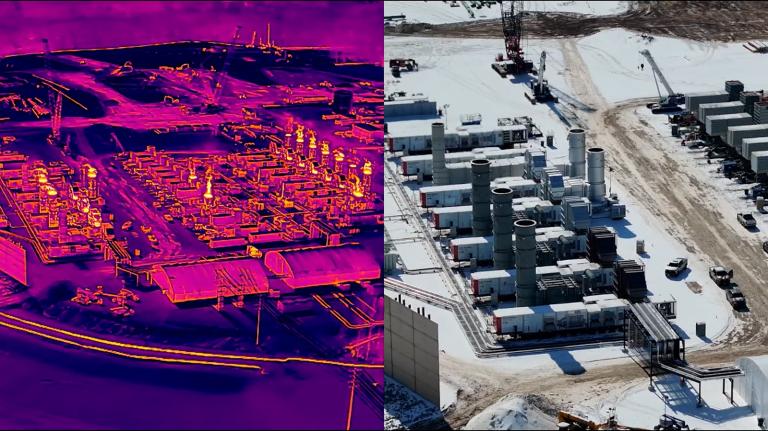Send your question to Umbra!
Q. Dear Umbra,
In light of the recent BP oil gush, I have begun to think more critically about where I purchase gasoline. And while I don’t drive all that often, when I do fill up every three or four weeks I would like to support companies that are taking extra measures in social and environmental responsibility. Are there any particular gas stations noted for this?
Rachel
Seattle
A. Dearest Rachel,
Your question reminds me of something Socrates once said: “The unexamined life is not worth living.” Given this massive and unyielding Gulf oil spill, your critical thinking about gasoline purchasing is just what we need to address our oil affliction.
Globally, we humans go through about 84 million barrels of oil a day, according to the American Petroleum Institute. Our current, unexamined use of oil is nearly as impractical and dangerous as this gas station scene from Zoolander:
The Gulf isn’t the only place in the world beset by leaking oil right now. Nigeria has oil spills going on concurrently with the Gulf disaster. You might be surprised to learn that the five major oil companies all have clean up plans that are very similar to BP’s. And we see how that plan’s working out.
So how do we turn this brown upside down?
Unlike coffee, the other brown fuel, gasoline does not have a “Fair Trade” label, the seal of approval that tells us better trading conditions and sustainable practices were embraced in the making of the product. In my dreams, an independent, non-governmental, not-for-profit organization would exist to promote the responsible use and management of oil. Like the Forest Stewardship Council which “encourages the responsible management of the world’s forests,” this new organization might have a sticker that tells us which gas is better to buy. We could call it the Oil Stewardship Council. If anyone is interested in starting OSC, sign me up to help.
Ah, but I digress, dear Rachel. You asked about which oil or gas companies are trying to do it right. (Before I answer that let me just say that in case you were thinking of boycotting BP, it isn’t really an effective option. Since most BP stations are owned by franchisees, making boycotts more painful to small businesses than to BP at large.)
Attempts have been made to rank oil companies. You can check Green America’s Responsible Shopper Guide, which rates an oil company’s level of social and environmental responsibility. Type the oil company name into the Responsible Shopper search field and you will be taken to a page chock full o’ oil information. Consider listening to La Gasolina while you browse.
Victoria Kreha, Responsible Shopper Coordinator, says Green America ratings are based on “published articles, reports by other organizations and level of egregiousness in the company’s practices.” But even the highest rated company, is still the “best of a bad lot,” according to Todd Larsen from Green America. Adds Kreha: “Exxon has funded climate change denial, Shell has been involved in human rights abuses, polluting local water supplies and poisoning crops.”
Since there’s no perfect choice, here’s how I like to think about buying gasoline … Every time we go to the pump, a pelican dies.
It’s a great motivator for using less gas. Which reminds me, Rachel. I want to commend you for driving infrequently. If we all drove a little less it could have a tremendous impact. Meatless Mondays are lowering people’s carbon footprints. May I suggest Carless Tuesdays?
If we all take the bus, bike, walk, telecommute or find some other carless way for just one day a week we could have a big impact with a small sacrifice. Even The New York Times concluded that “perhaps the best way for people to express outrage and inflict pain on oil companies is to use less fuel, thereby lowering overall demand.”
If you do have to get on the road, here are some of my favorite fuel-saving driving tips. And here are eight other ways you can help make a difference with the Gulf oil spill.
As you know, Rachel, the spill is a disaster. But if we’re smart and continue to examine our consumption habits, we can make better choices and a better world. This is our moment to change things. Thanks for stopping to fill up at this station, my friend.
Keep on trucking (figuratively, of course),
Umbra



